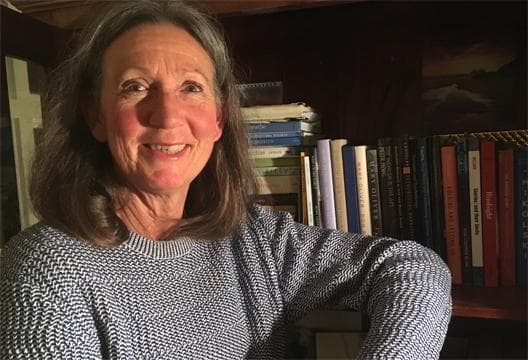
One on one… with Kitrina Douglas
‘Alternative stories are an antidote'
08 December 2015
Share this page
One delusion
'You have to start young if you want to get to the top in sport!'
When my father was about 52 he stopped playing football and started playing golf. During the school holidays he lured my younger sister and me to the driving range promising us ice-creams on the way home. At the range his friend, an international golfer himself, invited my sister and I to hit some shots.
'It's a shame Kitrina didn't play when she was younger,' he said to my father, 'I think she could have been quite good.' That comment set my father's cogs turning and a few days later he put the following proposition to me: 'Would you like to leave school and play golf for a year? If you don't like it you can return and complete your A-levels. If you like it, but aren't very good, you can continue with your A-levels. But if you like it, and become good, no one can stop you, you are your own boss and you can always complete your studies later in life.'
I went back after the school holidays and announced my intention to drop out and become a pro golfer. 'Do you think that's sensible?', my worried teacher asked. 'It's very difficult to make it in professional sport! Have you reached a high enough standard yet?' 'I don't know,' I said honestly, 'I haven't played yet'.
There are many points I could take from this, but the 'one' I want to make is this. It is increasingly becoming 'the systems' we put in place in sport that make it difficult, if not impossible, for a person to excel – rather than it being the individual not having any potential. In particular, talent development pathways in sport have increasingly become overly narrow and restrictive – more-so, it seems to me, than is good for young people or sport development.
One parental legacy
'We just wanted her to be happy!', parents say after their child has been identified as having extreme competition-related stress and anxiety, or has self-harmed or even attempted suicide. My father didn't just want me to be happy – he asked me to seek wisdom! Before I left on my first golf trip to America he bought a small travel Bible and asked me to read a chapter every day, suggesting I begin with Proverbs. I did as I was asked, but I remember feeling acute embarrassment doing so because I was sharing a room with two other golfers… I used to get up at 5am, lock myself in the bathroom and read my chapter. My secret never came to light until, years later, I recognised the significance of what I was reading in the shaping of my own identity and values: 'the race isn't to the swift or the battle to the strong but time and chance happen to all,' 'a gentle answer turns away wrath'. I was learning about life choices and consequences, of acting or being, one way or another. Six months later my father died; I continued reading.
One denial
Of all the words the press tried to put into my mouth, 'Wouldn't he be proud now?' (following my father's death and my winning a big event) is probably the one sentence that I resented, and reacted to, the most. I knew my father valued me – winning an event, even the most important golf event in amateur golf, the British Amateur Championship, after only taking up the game five years earlier, would not be what would make him proud. This isn't just a personal or familial issue – as David Cameron said when the cricket team won the Ashes, 'The whole country is proud'.
It worries me when we foster in young people an expectation that they have to win a big sporting event, or do something spectacular, in order to be valued. And it worries me that when any England team lose they are supposed to feel – and enact - shame. Counter-narratives, and alternative stories, are for me, an antidote, and much of my work now relates to challenging dominant and 'totalitarian' narratives that can be harmful, and life and identity limiting.
One song
Over the past decade I have not only watched my good friend, research partner and songwriter David Carless write songs, but I have also began to write songs myself from our research. One of these, a song called 'Gwithian Sands', tells the story of a woman in her 80s, who was born prior to WW2, and who never learned to write because she had to quit school and find work after her father died when she was a child. She told David and me that when she started work her teacher, understanding poverty, turned a blind eye to her absenteeism, as many teachers did. The process of writing a song, for me, is intense, embodied joy and amazement, only perhaps surpassed when the song becomes meaningful in other people's lives (for examples, search online 'you tube kitrina douglas'). As psychologists, we understand the need for humans to be creative and to be inspired and motivated – and we know the importance of relational ways of being, of connection, communion and sharing with others. As a practitioner, 'songwriting' reminds me of these things. 'Gwithian Sands', and people's responses to it, has galvanised me to support creative arts-informed methodologies – be they on the fringe of acceptance in our discipline.


